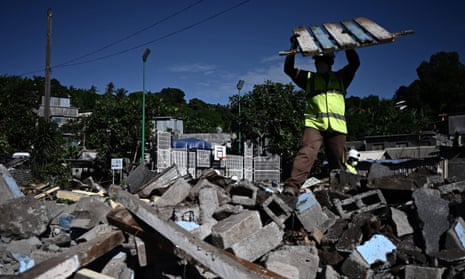It took less than 24 hours to raze the shantytown of Talus 2 on the French Indian Ocean island of Mayotte. France’s Operation Wuambushu (“take back”) began on Monday last week in its overseas territory, between Madagascar and Mozambique, with a dozen excavators and trucks carrying police officers. By Tuesday 23 May, most of the neighbourhood’s 162 informal homes had been destroyed, leaving hundreds of people without shelter.
Details of the operation were revealed in February as President Emmanuel Macron approved sending 510 additional French police officers to Mayotte with the aim of fighting “gangs, substandard housing and irregular immigration”.
Backed by far-right collectives and elected officials in Mayotte, the Macron government has begun waging a tough battle on the island.
Already, police have been using live rounds and arresting young people alleged to be involved in criminal gangs. The government reportedly aims to deport between 10,000 and 20,000 undocumented people (310,000 people live in Mayotte, an estimated half of whom are foreigners), and to destroy 1,000 bangas, or informal housing, in slums where 40% of the island’s inhabitants live.
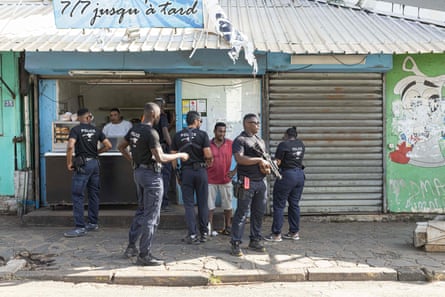
Undocumented immigrants will be sent to the state of Comoros, comprising three of the four islands in the archipelago that includes Mayotte, and where many of the undocumented originated.
Wuambushu, officially announced in April, has revived debate on Mayotte, the poorest department in France, where most deportations on the entire French territory occur.
Residents say the operation has brought a climate of fear that has crystallised into violent anti-Comoran sentiment. On 24 April, the initial intended start date of the operation, Salime Mdéré, vice-president of the departmental council of Mayotte, talked about “thug” and “terrorist” Comoran youths on evening television. “It might be necessary to kill some of them,” he said. “I’m weighing my words.”
The operation faced delays: a judge suspended the demolition of Talus 2 on 24 April, citing a lack of housing solutions for evicted families, while the Comoran government initially refused to accept deportees. But in mid-May, the prefecture successfully appealed against the court’s decision, and the Comoran port reopened to Mayotte’s boats after the Comoran president visited France.
In the meantime, police continued an anti-delinquency operation, arresting suspected gang members in violent clashes. At least one teenager, who claimed not to have been involved in crime, was shot.
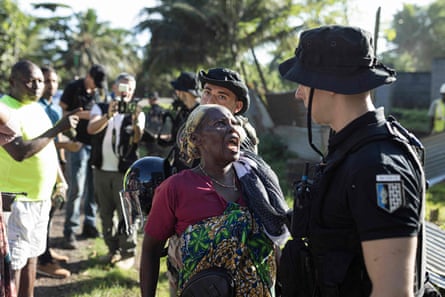
For those without papers, it is an intensification of a “hunt for the undocumented” that has existed for decades. Océane*, 37, who has two young children and has lived in Mayotte since leaving the Comoro island of Anjouan in 2015 , has no legal status and says her landlord has told them to leave due to the operation. She left a violent situation at home, but is now contemplating going back.
“I’m not going to wait for the authorities to arrest me,” she says. “I failed. I didn’t get my papers.”
Many cross the 70km channel between the islands for healthcare unavailable in the Comoros. But while Mayotte benefits from resources due to its status as a European region, it suffers from its best medical staff leaving to work in France.
Océane says her ordeal didn’t begin with Wuambushu. “Everywhere I moved, I had to hide because there was the police, or Mahorans, who would come and report you,” she says.
Police presence is heavy in Mayotte, where numerous legal exceptions made in the name of controlling migrants have meant identity checks based on profiling, and routine unannounced police raids on people’s homes. It has, in effect, turned the territory into a police state, say human rights groups such as La Cimade.
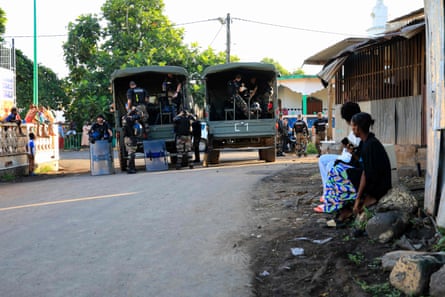
Océane says she regularly has to go through fields to take her daughter to school undetected, or hide out with neighbours when she hears the police are circling. The Mamoudzou hospital refused to give her son a birth certificate when he was born in 2018, making it impossible to sign him up for school.
Océane says those who told her landlord to evict her were not police but members of citizen collectives. Such groups have been holding pro-Wuambushu rallies, blocking hospitals that treat foreigners, and threatening to block ports if Comoros-bound ships don’t take undocumented migrants. This is similar to the xenophobic evictions in 2016, when collectives went door-to-door, searching for foreigners.
This month, a flyer was distributed in the village of Hagnoundrou, ordering all foreigners to leave. “Don’t forget to bring your children with you,” it read. “They are part of your luggage.”
Collectives have strong links to the islands’ political elite: a former president of one is Estelle Youssouffa, the Mahoran deputy in the National Assembly since 2022. She has previously said that small boat factories in the Comoros should be bombed to stop migrants.

Like Mdere, many blame Comoran youth for violence on the island and claim that Wuambushu will combat insecurity. Gang rivalries have led to violence in the past – last November, clashes resulted in several deaths.
French interior minister Gérald Darmanin, who sent an anti-terrorism police unit to contain the clashes, has repeatedly emphasised the anti-delinquent aspect of the operation. “There is a situation of serious delinquency, and we must respond with firmness,” he said in an interview with Le Figaro.
Others point to a more complicated reality, saying the gangs include poor Mahorans. Yousef*, who arrived in Mayotte from the Comoros as a child and is a member of La Cimade, says France is following inhumane policies on the island. He asked not to use his real name for fear of being targeted.
“Mayotte is not the same as France,” he says, listing numerous obstacles that foreign-born children face – from being barred from schools to being denied citizenship or separated from deported parents.
Yousef, who works as a school bus driver and struggled to obtain his own papers, says he has seen the consequences first-hand. “Children as young as 10 have to rely on themselves to eat, to dress themselves, to house themselves, and there is no social welfare for these kids. These are monsters that we are creating.”
He says children ask him to drop them outside their homes to avoid being seen by police. Mayotte locks up a high number of undocumented children – in 2021, France detained 3,135 children in Mayotte.
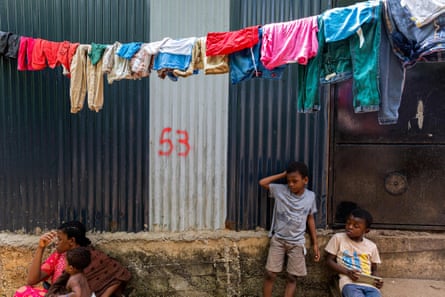
The operation has revived debates around French colonialism, specifically Mayotte’s status as a French department, made official in 2011. The Comoran archipelago fell under French colonial rule in the mid-19th century and voted overwhelmingly for independence from France in 1974, but Mayotte – representing 8% of the total electorate – was against. France held a second referendum in 1976, with similar results. The UN general assembly has condemned France’s presence in Mayotte.
Ties between the islands remain strong, most Comorans and Mahorans have family on both sides. Mayotte’s economy relies heavily on foreign labour, particularly in construction. “If Darmanin had a magic wand and could transfer all the populations back to their islands, the first effect would be to destroy the local economy,” said anthropologist Damien Riccio in an interview with Mediapart.
Some offer a political explanation for France’s actions, saying the government is trying to showcase its immigration offensive after forcing through an unpopular pension reform in April that triggered large-scale protests. Wuambushu has become a platform for Macron’s government to appear tough on immigration in the face of far-right figures such as Marine Le Pen, who claim it does not go far enough.
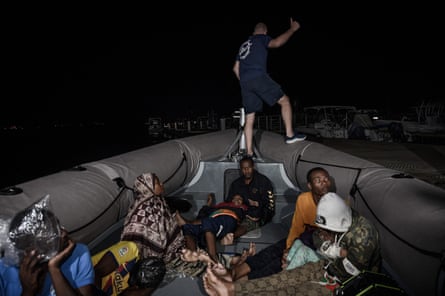
France has significant economic interests in the Mozambique channel, and Mayotte allows control in one of the largest maritime exclusive economic zones in the world. “France is only there to enrich itself, not to develop the island,” says Yousef. “France doesn’t want the island or the island’s population – all it wants is the riches around it.”
Youssouffa has emphasised the region’s natural resources: “The Mozambique channel, where Mayotte is located, has significant gas reserves,” she said in a recent interview. “It’s important to let the entire regional gas and petrol ecosystem know that we have an interest in their working in our region, and that they must make particular efforts for security to stabilise that region.”
Meanwhile, deep divisions have been fostered between historically linked people. Océane says she doesn’t want to move back to Comoros, but has little choice.
“I don’t believe in the French Republic any more,” she says. “What do you want me to do, when I have kids and they didn’t even give one of them a birth certificate?
“France is destroying my kids’ future, and what do you want me to do, stay like this, and live a life of playing cat and mouse? To be discriminated against, insulted, humiliated everywhere I go? I can’t take it any more, my kids can’t take it.”
* Names have been changed
